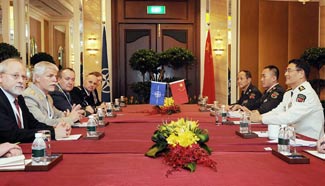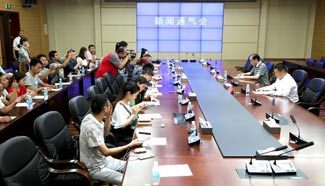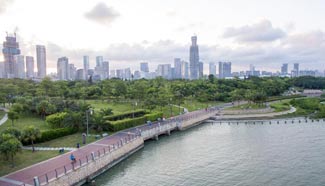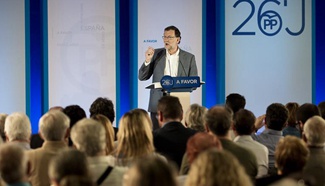An aerial photo taken on Sept. 25, 2015 from a seaplane of Hainan Maritime Safety Administration shows cruise vessel Haixun 1103 heading to the Yacheng 13-1 drilling rig during a patrol in South China Sea. (Xinhua/Zhao Yingquan)
By Tai Beiping, Ma Yujie
SINGAPORE, June 4 (Xinhua) -- U.S. defense secretary's China "self-isolation" claims were totally incorrect, local analysts said here on Saturday.
In a speech delivered here Saturday at the on-going Shangri-La Dialogue, U.S. Defense Secretary Ashton Carter said China could end up erecting a Great Wall of self-isolation, but analysts here refuted Carter's remarks as one-sided and over-exaggerated.
As China develops, Asia-Pacific countries had built close relations with not only the United States but also China, which proves Carter's China "self-isolation" claims at best "exaggerated," said Huang Jing, Professor and Director of Center on Asia and Globalization, Lee Kuan Yew School of Public Policy, National University of Singapore.
Carter's claims are misinterpreting China's policies, and are not in line with the two countries' consensus on forging new pattern of relationship, said Colonel Lu Yin, Associate Researcher from the Institute of Strategic Studies of China's National Defense University.
The colonel noted that Carter's remarks revealed logical paradoxes in the U.S. rebalance strategy in the Asia-Pacific.
"I don't see it possible that without efforts from China, the United States can realize its rebalance strategic in the Asia-Pacific region as well as achieve common prosperity as envisioned," said Lu.
In his half-hour or so speech, the U.S. defense secretary mentioned the word "principle" for as many as 37 times. In Professor Huang Jing 's view, it is fairly disputable that the United States does faithfully stick to principle.
When asked about the fact that not only China, but countries including Japan, the Philippines and Vietnam all had similar construction actions, Carter said there are differences in the scale of such activities.
If one really sticks to principles, it doesn't matter what scale the actions might be, any construction activity is against the principle, argued Professor Huang.
On matters of navigation freedom, the professor said that navigation freedom should be guaranteed, but any country's freedom shall not be at the cost of posing threats to others.
Although tensions in the South China Sea are included in Carter's speech, analysts pointed out that the U.S. defense secretary had also elaborated on the fact that China and the United States do have cooperation potentials over a number of international agendas. To safeguard peace and stability in Asia-Pacific, the two countries need to cooperate.
Oh Ei Sun, senior fellow with S. Rajaratnam School of International Studies in Singapore, said that Carter actually adopted a relatively "mild" approach when addressing disputes in the Asia-Pacific and gave much emphasis on setting up security networks in the region.
William Choong, Shangri-La Dialogue Senior Fellow for Asia-Pacific Security, said he thought the U.S.-China relations are far more inclusive.
It's a broader relationship, although they disagree on the South China Sea issue, they can agree on many other issues which are important, such as the cooperation in cyber space, the DPRK issue, and climate change, he said.
The two countries are preparing for their upcoming strategic economic dialogue as well, he noted.
"To put it very simply, even though there are tensions in the South China Sea, I think the relationship is broad enough and strong enough, and has enough institutional mechanism for both sides to avoid their differences and work on potential solutions," said the researcher.












